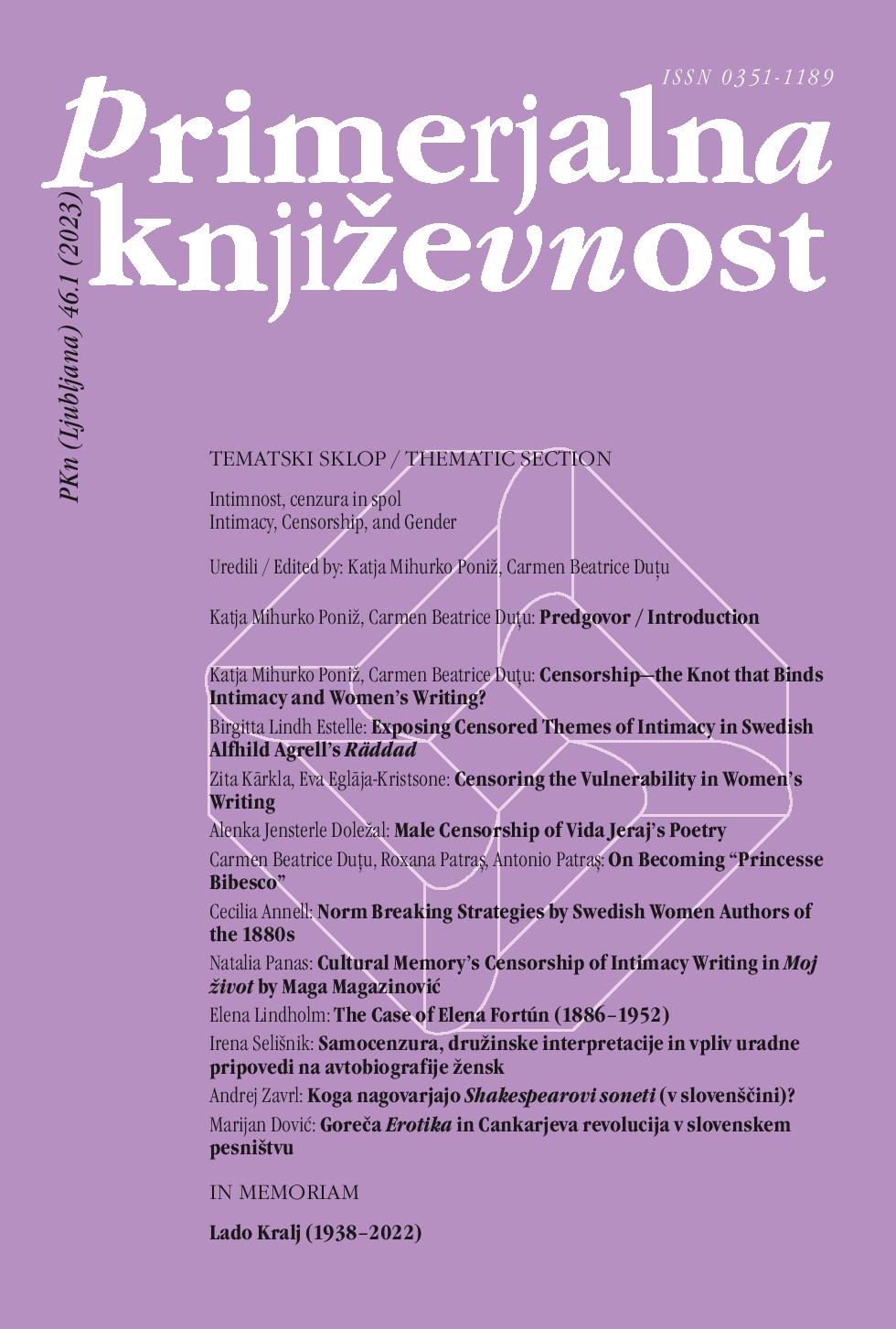Double-Censored Freedom? Cultural Memory’s Censorship of Intimacy Writing in Moj život by Maga Magazinović
DOI:
https://doi.org/10.3986/pkn.v46.i1.07Keywords:
Serbian literature, autobiography, intimacy, cultural memory, censorship, Magazinović, Maga, emancipatory discourseAbstract
Maga Magazinović (1882–1968) was a Serbian dancer artist and teacher. In this article, I analyse her little-known ego-document Moj život (2000), considering it as an example of first-person narrative due to her strategies of presenting intimacy in literature through genres such as diary and confession. I use cultural memory to research Magazinović’s contribution to the cultural life of Serbia (memory object), what she transferred to her intimate description (memory medium), and then has been deliberately excluded by censorship from collective memory as inconsistent with the canon of Serbian cultural memory. Magazinović’s intimacy writing broke all cultural taboos by describing close relationships and emphasizing the romantic ones, through her free thinking, blatantly advocating for feminism, and exposing the female private realm so far isolated against both the prudish nature of patriarchy and the new socialist reality. Therefore, I show the emancipatory perspective of a woman’s body that frees itself from censorship limitations and its unconventional expression of intimate emotions through modern dance and writing. Moreover, I underline that this perspective in cultural memory was regulated by two censorship systems: that of moral/erotic nature in Kingdom of Yugoslavia and ideological/political one in socialist Yugoslavia.
References
Bińczyk, Ewa. “O czym szepcze władza (w ujęciu Michela Foucaulta).” <em>Przegląd Artystyczno-Literacki</em> 9 (1999): 67–72.
Czermińska, Małgorzata. <em>Autobiograficzny trójkąt: świadectwo, wyznanie, wyzwanie</em>. Kraków: Universitas, 2020.
Mackenzie, David. “Ljuba Jovanović-Čupa and the Search for Yugoslav Unity.” <em>The International History Review</em> 1.1 (1979): 36–54.
Magazinović, Maga. <em>Moj život</em>. Ed. Jelena Šantić. Beograd: Clio, 2000.
Milanović, Jasmina. “Предговор приређивача.” Author Delfa Ivanić. <em>Успомене</em>. Ed. Jasmina Milanović. Beograd: Institut za savremenu istoriju, 2012. 5–30.
Obradović Ljubinković, Vera. <em>Koreodrama u Srbiji u 20. i 21. veku: rodna perspektiva</em>. Novi Sad: Pokrajinski zavod za ravnopravnost polova, 2016.
Pančić, Olivera, and Dragomir Zupanec. “One su pomerale granice: Jedan život / Marija Maga Magazinović.” <em>YouTube</em>. Uploaded by RTS Kulturno-umetnički program—Zvanični kanal. 2017. https://www.youtube.com/watch?v=lLLUvkyQuok&ab_channel=RTS Kulturnoumetni%C4%8Dkiprogram-Zvani%C4%8Dnikanal.
Rodak, Paweł. “Autobiografia.” <em>Od aforyzmu do zinu: gatunki twórczości słownej</em>. Eds. Grzegorz Godlewski et al. Warszawa: Wydawnictwa Uniwersytetu Warszawskiego, 2014. 43–50.
Rodak, Paweł. “Review. Philippe Lejeune, Wariacje na temat pewnego paktu: o autobiografii.” <em>Pamiętnik Literacki</em> 2 (2002): 245–252.
Tomić, Svetlana. “Rediscovering Serbian Women’s Memoirs: Gendered Comparison in a Historical Context.” <em>Teksty Drugie</em> 1 (2020): 124–139.
Tumbas, Jasmina. <em>“I Am Jugoslovenka!” Feminist Performance Politics During and After Yugoslav Socialism</em>. Manchester: Manchester University Press, 2022.


